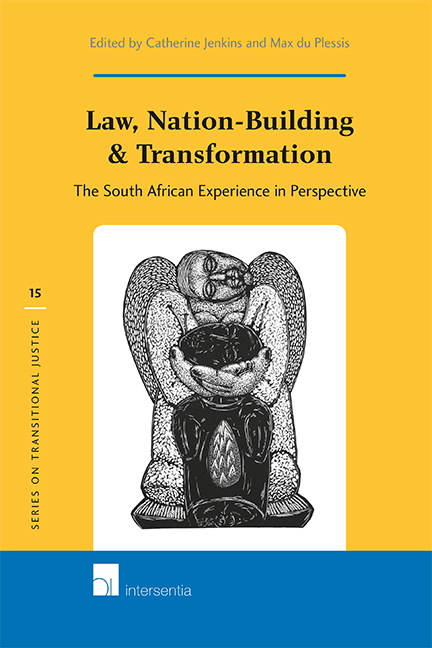Book contents
- Frontmatter
- Editors’ Foreword
- Contents
- Chapter 1 Transitional Justice: Lessons from South Africa?
- Chapter 2 Reflections on Post-Apartheid Nation-Building: Identity, Participation, Community
- Chapter 3 The Truth and Reconciliation Commission Process: A Retrospective
- Chapter 4 Rights at Work: The Transition to Constitutional Democracy and Women in South Africa
- Chapter 5 Crime, Policing and Nation-Building
- Chapter 6 Public Schools for Afrikaners in South Africa
- Chapter 7 Behind the Mask of the Rainbow Nation: The Limits of Law in Post-Apartheid South Africa
- Chapter 8 The Transformation of the Judiciary
- Chapter 9 Assessing the Social Transformation Performance of the South African Constitutional Court: From Totalitarianism to the Rule of Law
- Chapter 10 The Transformation of Land Law
- Chapter 11 The South African Presidency in Comparative African Context
- Chapter 12 Aspects of the Treatment of Freedom of Expression in South Africa’s Democratic Transition
- Chapter 13 Constitutionalism in Commonwealth Africa: Comparative Perspectives
Chapter 2 - Reflections on Post-Apartheid Nation-Building: Identity, Participation, Community
Published online by Cambridge University Press: 16 December 2020
- Frontmatter
- Editors’ Foreword
- Contents
- Chapter 1 Transitional Justice: Lessons from South Africa?
- Chapter 2 Reflections on Post-Apartheid Nation-Building: Identity, Participation, Community
- Chapter 3 The Truth and Reconciliation Commission Process: A Retrospective
- Chapter 4 Rights at Work: The Transition to Constitutional Democracy and Women in South Africa
- Chapter 5 Crime, Policing and Nation-Building
- Chapter 6 Public Schools for Afrikaners in South Africa
- Chapter 7 Behind the Mask of the Rainbow Nation: The Limits of Law in Post-Apartheid South Africa
- Chapter 8 The Transformation of the Judiciary
- Chapter 9 Assessing the Social Transformation Performance of the South African Constitutional Court: From Totalitarianism to the Rule of Law
- Chapter 10 The Transformation of Land Law
- Chapter 11 The South African Presidency in Comparative African Context
- Chapter 12 Aspects of the Treatment of Freedom of Expression in South Africa’s Democratic Transition
- Chapter 13 Constitutionalism in Commonwealth Africa: Comparative Perspectives
Summary
INTRODUCTION: THE STRUGGLE FOR WHAT?
On the V&A Waterfront tourist area in Cape Town stand slightly larger than life-size bronze sculptures, next to each other, of the four South African Nobel Peace Prize winners: Albert Luthuli, Desmond Tutu, Nelson Mandela and FW de Klerk. Awarding such medals to four figures from a single country could be seen as reflecting recognition of and high regard for three periods in the process of change in the country towards a democratic order: the long struggle against a racist and unjust society; the resolution of that struggle through a negotiated settlement; and a subsequent process of revelation, reconciliation and transition to a new notion of being South African. There would be one understandable misperception – Tutu did not receive his award for the post-1994 contribution through serving as chairperson of the Truth and Reconciliation Commission (TRC). In each case, both in the award and in the statements from the recipients, the recognition was for a people's struggle against exclusion from democracy.
Albert Luthuli, then president of the already banned African National Congress (ANC), received his Nobel prize in December 1961 in Oslo at a dramatic turning point in the struggle, shortly after the Sharpeville massacre, a change from peaceful appeals for inclusion in a single polity to armed struggle against an intransigent and racist apartheid government. In his acceptance speech Luthuli referred to a ‘threefold significance’ to the award: first, as a ‘tribute to my humble contribution to efforts by democrats on both sides of thecolour line to find a peaceful solution to the race problem’; second, to recognise that the award ‘is a democratic declaration of solidarity with those who fight to widen the area of liberty in my part of the world. As such, it is the sort of gesture which gives me and millions who think as I do, tremendous encouragement’; and, third, ‘it is a welcome recognition of the role played by the African people during the last fifty years to establish, peacefully, a society in which merit and not race, would fix the position of the individual in the life of the nation’.
- Type
- Chapter
- Information
- Law, Nation-Building and TransformationThe South African Experience in Perspective, pp. 41 - 64Publisher: IntersentiaPrint publication year: 2014

